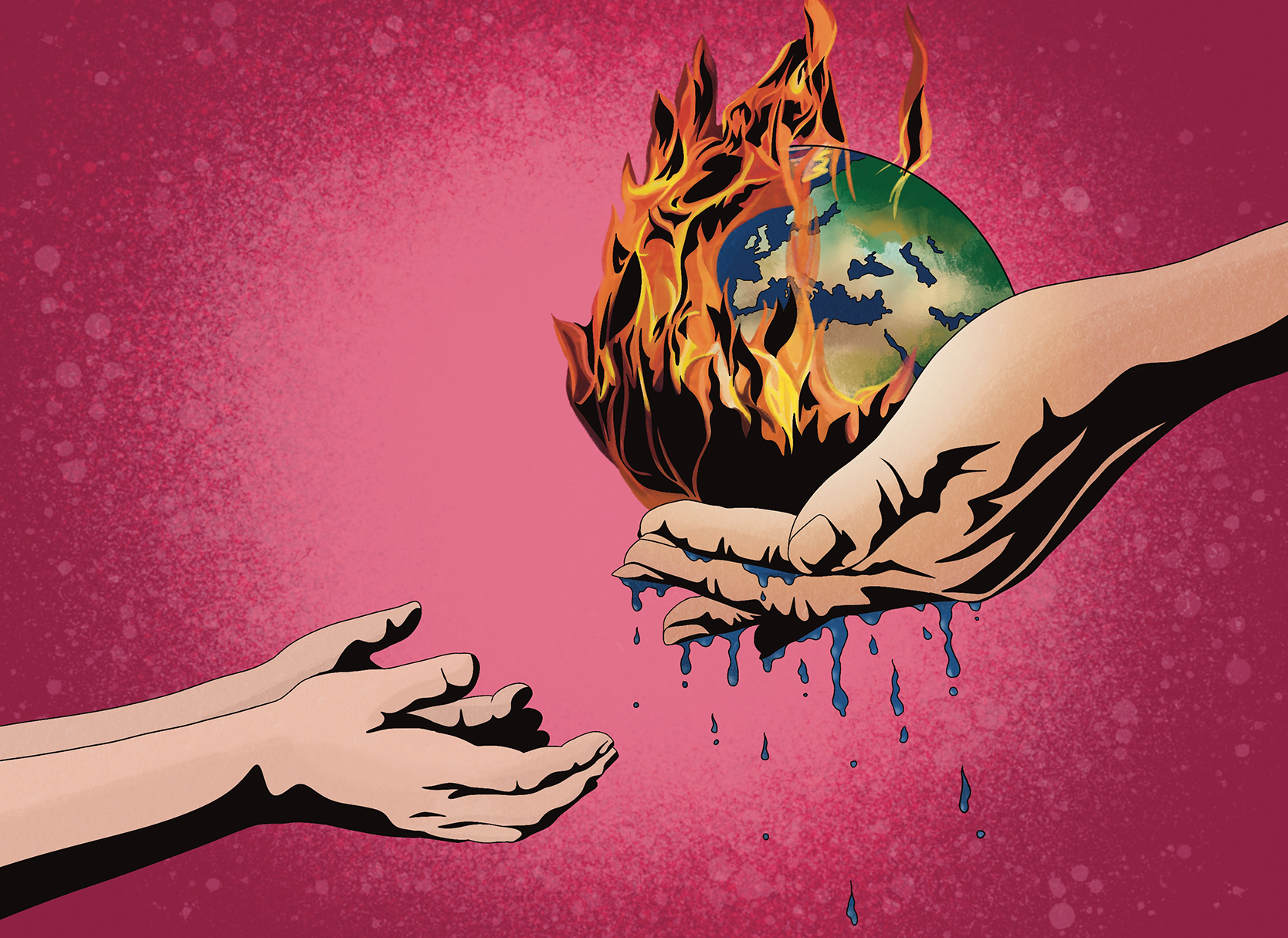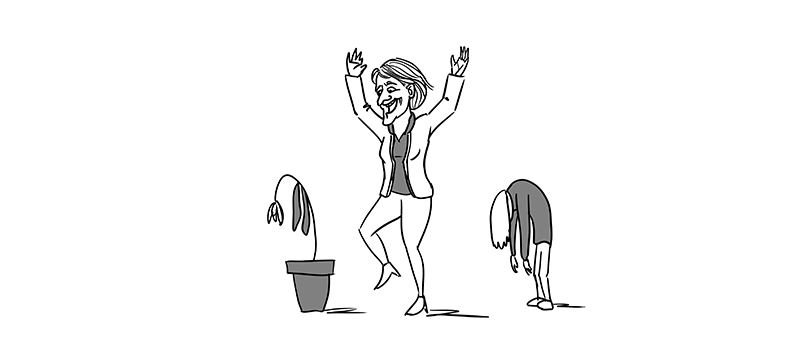Given all the worries about climate change, political instability and global conflicts, do Wageningen students still want to bring babies into the world?
She can’t decide whether she wants kids. In fact, student editor Marte* (23) isn’t even sure she should want kids. And she knows she’s not the only one. Increasingly, she hears students in her circle pondering the dilemma of whether or not to have children. So Marte decided to investigate the matter further for Resource. Three other Master’s students joined her in this soul-searching exercise.
Family Feelings
One of them is Ana (25), a Forest & Nature Conservation Master’s student from Brazil. She grew up in a large, noisy family. ‘In Brazil, family is the top priority. Ever since I was young, I have dreamed of having a family. However, I’ve never had a maternal instinct, so that feels contradictory. My parents always talk about having grandchildren. It feels sad to tell them that might never happen. On the other hand, I think it’s too much to have kids just so my parents can fulfil their wish to become grandparents. That feels too big a sacrifice.’
‘My bisexual orientation makes the situation a bit more complex,’ explains Ana. ‘I’m not currently in a relationship, but I might end up with a woman and we might not be able to have children together. Luckily I can discuss these topics with friends who are also part of the LGBTQI community.’
Footprint
Marte wants to have children, but for a long time she felt guilty about this. ‘Sustainability is an important issue for me and I used to struggle with my responsibility for the ecological footprint of any offspring. Are you responsible as a parent for the ecological footprint of an entirely new human being? I’ve now figured out my own answer to that question and I feel it’s ethically OK to have children to keep the population stable. If two people have two children, they are creating a new generation without increasing the world population.’
That is also how Jes (23), a Resilient Farming & Sustainable Food Systems Master’s student from the Netherlands, sees it. ‘There are big issues facing society, and perhaps I’m being naive, but I have a positive attitude. As long as a Third World War doesn’t break out and no atom bombs fall, I see a life for the generation that comes after me. I try to be a good person for myself and the people around me, without too much of an impact on the environment, and if I can pass that message on to my kids then they can have a positive effect on their generation.’
You can’t carry the whole world on your shoulders
That is Marte’s opinion too. She also doesn’t feel quite so powerless thanks what she has learned from her degree in Climate Studies. ‘As a child, I found the environmental and climate problems hard to get a grip on, which made them frightening. It’s like that song that children’s choir used to sing when I was young: “The Earth is getting too hot. So hot it’s melting. And if we don’t do anything, it won’t have long to go.” Now that I’m an adult and have learned things through my degree, I don’t find the issues so hard to pin down, nor do I feel so powerless, and I realize I’ll be able to help make the world a better place later through my job.
Crises
Ronja (24, from the Netherlands), who is doing the same degree as Jes, is finding it harder to decide whether or not to have kids. ‘It really feels like an internal struggle. I can imagine it’s a very special experience to have a baby and have that parent-child bond with someone. However, I have doubts about whether I want to bring a new person into the world the way I fear it’s going to be in the near future.’
If I was to get pregnant now, I would find the decision really hard
The future feels threatening and frightening to Ronja, even if she has difficulty imagining what it will look like exactly. ‘I think climate change will lead not only to less stable weather conditions but also to more conflicts and a less stable political climate. Even my generation will see that happen. I expect the various crises to exacerbate one another. Sometimes I get the feeling we won’t live to see our fiftieth birthdays. At the same time, I realize my thoughts are influenced a lot by what I read and see here. But it feels weird to have to choose whether to bring someone into the world knowing they will have to endure all that.’
For Ana, fear of climate change is not the main factor in deciding whether or not to have children, although she is shocked by the impact climate change is already having. ‘Paradoxically, that means some countries are encouraging couples to have children, even though there is global overpopulation. Perhaps adoption is ethically the best solution.’
Sign of love
All four students think it is human nature to want to reproduce. Marte: ‘My grandmother sees having babies as a sign of love between two people but also as an expression of hope for the future; you can’t carry the whole world on your shoulders. She would like me and her other grandchildren to be more relaxed about the baby dilemma; I find that touching. I notice that when I’m in a good place, I find the negative aspects of society easier to bear. Then it feels only logical to want to share this world with a kid. And when I’m in love, my hormones and feelings take over from my rational side.’
I am optimistic; I think things will be all right in the end
Ronja also thinks it is in our nature to want to reproduce. ‘But there are too many people on this planet to live together healthily. I don’t blame anyone else if they decide to have babies and I won’t blame myself either if I give in to my human nature later. But I find it too difficult at the moment to decide whether to have kids.’
Hypothetical
Although these students are already thinking and talking a lot about whether to have kids, none of them feels a need to bring children into the world at this stage in their lives. Maybe after they hit 30. Ronja: ‘I don’t believe either that women in the Netherlands have to have a baby to meet society’s expectations. Perhaps that’ll change when I’m 30.’
Even so, the topic has become somewhat more relevant recently for Ronja. ‘I am in a steady relationship and six months ago I stopped using an IUD as contraception because I had too many side effects. We are currently using condoms, which feels less safe as a way of preventing pregnancy. Pregnancy seemed a more distant prospect when I was still using an IUD. If I was to get pregnant now, I would find the decision really hard. I don’t like the idea of an abortion either, although I totally understand that other people might go for that.’
Older
Jes: ‘I think I want children, but not yet. I’ll seriously consider the matter when I’m around 30. My brothers are about 10 years older than me and already have children. I can see how nice it is to be a parent, but I also see how draining it is on their energy and attention. At the moment, I’d rather spend my time learning and discovering things.’ Marte agrees. ‘My baby dilemma is a philosophical question. I think I’m too young at the moment to be a mother. That is partly because of my upbringing: develop yourself first, and you can always have children later.’
Ana’s mother in Brazil sees things differently. ‘My mother recently said that maybe I should consider having my eggs frozen. I don’t want that, even though it’s normal these days. My mother had me when she was 24. She may be worried that my childbearing days will soon be over. I’m not so worried myself — I still have all the time in the world.’
Falling birth rates
Family sociologist Katya Ivanova, an assistant professor at Tilburg University, read the interviews with the four WUR students. Ivanova does research on voluntary childlessness. She tries to understand how our views on the future and pessimism about society influence family planning.
‘I’m not remotely surprised by the students’ arguments given their ages and backgrounds. In empirical studies of the desire to have babies among students in their early to mid-twenties, we see similar arguments to what these students are saying. This is clearly something young people are thinking about nowadays. But what you say is not necessarily what you do. It is all still hypothetical for these students. Only one study has been published to date tracking young people over a longer period and collecting responses at multiple points in time about their wish to have kids. That publication showed that more climate-aware people were less likely to have kids than less climate-aware people.
‘A few years have passed since then and additional data is available on the same group of participants for follow-up analyses. The provisional results show that these people mainly postpone the decision to have children. Some do have babies when older, while others remain childless. Another factor is that the longer you wait to have kids, the smaller the chance of success because of the ticking biological clock. It might no longer be a voluntary choice.’
External influence
‘Even so, my own research shows that if people are pessimistic about the future, they are less likely to bring children into the world. With that in mind, you may wonder what the effect is of all the sombre reports of a world in flames that the media is constantly bombarding us with. Not much research has been done on the effect of the picture presented by the media on reproduction rates, but an Italian study from 2023 saw the number of births fall when the number of news items about an economic crisis increased. So in that sense I can understand why WUR students are discussing with one another whether they want to bring babies into the world.’
*For privacy reasons we give only the students’ first names. Their surnames are known to the editors.

 Illustration Valerie Geelen
Illustration Valerie Geelen 

